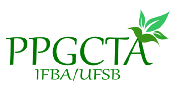Banca de DEFESA: FABIO FERNANDES CORREA
Uma banca de DEFESA de MESTRADO foi cadastrada pelo programa.DISCENTE : FABIO FERNANDES CORREA
DATA : 29/04/2019
HORA: 08:00
LOCAL: Barra Velha - https://mconf.rnp.br/webconf/csc-2
TÍTULO:
The New Forest Code and rural properties in the extreme south of Bahia: a recent methodological approach to environmental monitoring
PALAVRAS-CHAVES:
Environmental regularization of rural properties; conduct adjustment term; permanent preservation area; legal reserve area; atlantic forest.
PÁGINAS: 869
GRANDE ÁREA: Outra
ÁREA: Ciências Ambientais
RESUMO:
The present study seeks to understand the system that involves environmental protection legislation, including the Atlantic Forest biome, through the verification of the situation of rural properties in the extreme south of Bahia. We describe how the Public Prosecutor's Office worked to restore permanent preservation areas and legal reserve areas, through conduct adjustment terms (TAC), in which those responsible for rural properties have committed to their environmental regularization. The choice of the theme arose from the need to evaluate the commitments assumed, through mechanisms that allow to carry out a monitoring of the environmentally protected areas, with the consequent guarantee of the fundamental right to the ecologically balanced environment. In spite of the obligation of the Public Prosecutor´s Office to supervise TACs, for these instruments there are no standardized means for environmental monitoring. To fill this gap, through the results obtained, the research proposes a method of analysis to verify compliance with the New Forest Code. The methodology used in this research consisted of a bibliographical and normative review, as well as the analysis and comparison of images of Google Earth among the latest available and dates close to the TACs signed in 2012, covering 318 rural properties. The shapefiles were extracted from the State Forest Registry of Rural Property (CEFIR) and a qualitative evaluation to compare the situations of the permanent preservation and legal reserve areas was carried out. The results indicate that in 128 (40.25%) of the total rural properties, the situation of the protected areas was maintained; there was an increase in forest cover in 75 (23.58%); in 14 (4.40%) there was a decrease of vegetation; it was not possible to perform the analyzes in 101 (31.76%) areas. Even if the restorations are within the period established in the legislation, the large number of maintenance of the protected areas may indicate that other actions need to be adopted, in addition to the conduct adjustment terms, for the correct adequacy of rural properties. In observing the decrease in forest cover, an immediate inspection by the competent environmental agency is required. In the event of an increase, maintenance or impaired analysis, the Public Prosecutor´s Office may notify the committed landowner to adopt measures for the registration or corrections of the rural property in CEFIR. Not being the case of inspection or notification, there will only be a future monitoring of the environmental situation of the properties. In this sense, the results propose that the notification of the committed landowner to register or correct CEFIR in 204 (64.15%) of the analyzes occurs. 64 (20.12%) cases indicate the need for an inspection by the environmental agency; and in 50 (15.72%) properties will be given continuity to the monitoring. It was concluded that, even if there is a gap between the intention of the legislator and what is observed in practice for environmental protection, this research demonstrates that there are tools that can help in the real implementation of laws, including positive practical implications for the performance of Public Prosecutor´s Office.
MEMBROS DA BANCA:
Externo ao Programa - 1955705 - GABRIELA NAREZI
Interno - 1932539 - JOAO BATISTA LOPES DA SILVA
Externo ao Programa - 1126355 - PATRICIA AURELIA DEL NERO
Presidente - 1556362 - ROBERTO MUHAJIR RAHNEMAY RABBANI



